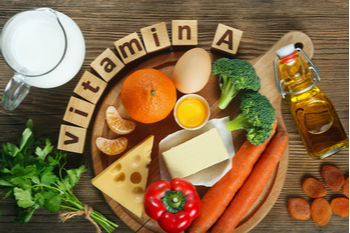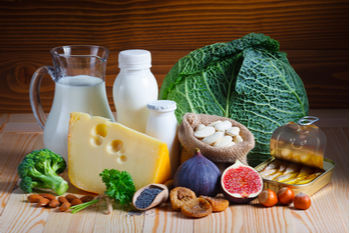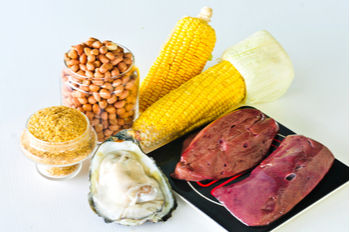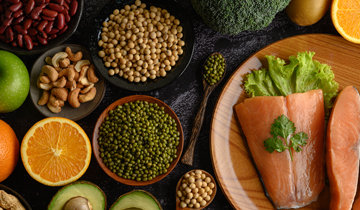- Home
- Blog
- Health & Nutrition
7 Micronutrients You Should Never Miss Out On!
Health & Nutrition
7 Micronutrients You Should Never Miss Out On!
By Apollo 24|7, Published on- 11 July 2022, Updated on -18 October 2022
Share this article
0
64 likes

We often evaluate the nutritional quotient of any natural food on the basis of its vitamin and mineral value. Both vitamins and minerals are called micronutrients as they are required in smaller amounts but play an important role in preventing several diseases. Vitamins include fat-soluble (vitamin A, D, E, and K) and water-soluble vitamins (vitamin B and C), while minerals are divided into macrominerals and trace minerals. Micronutrients are necessary for the production of energy, proper growth of the body, maintenance of bone health, effective functioning of the immune system and several other processes. While every micronutrient has an essential role to play in keeping the body healthy, let’s look at some of the most important ones.
1. Vitamin A
Vitamin A is essential for the functioning and maintenance of the eyes, heart, lungs, and kidneys. It is found in spinach, amaranth, pumpkins, carrots, milk, meats, fish liver oils and egg yolks. Adults generally require 600 micrograms (mcg) of vitamin A, however, the demand increases to 950 mcg during breastfeeding.

2. Vitamin D
Vitamin D is essential for maintaining the immune system and the absorption of calcium in the body. The skin makes vitamin D on exposure to sunlight, while the food sources of this vitamin include cod liver oil, egg yolk and mushrooms. Adults require 5 to 15 mcg of vitamin D every day.
3. Calcium
Calcium is extremely important for the development and functioning of bones and teeth. It also helps in muscle and blood vessel contraction. Dairy products such as milk, cheese, and curd are rich sources of calcium, while non-dairy sources include seafood, legumes and dried fruits. Adults require 400 milligrams (mg) of calcium every day but the requirement increases to 1000 mg every day during pregnancy and lactation.

4. Iron
Iron is important for the physical and cognitive development of children. Low iron levels can result in anaemia in both children and adults. Iron is abundantly present in spinach, broccoli, beetroot, potato, pomegranate, apple, whole grains, and beans. Adults require 28 to 30 mg of iron every day but the requirement increases to 38 mg during lactation.
5. Folate
While folate is the naturally occurring form of vitamin B9, folic acid is man-made. Folate helps in utilising fats and proteins stored in the body and also clears out high levels of homocysteine, which can otherwise result in heart diseases. While adults require 400 mcg of folate every day, the requirement increases to 600 mcg during pregnancy and lactation. Folate can be found in mushrooms, broccoli, lentils, beans, spinach, beans, egg yolk, beetroot and liver.
6. Zinc
Zinc is a trace mineral that boosts the immune system, promotes wound healing, delays age-related macular degeneration, and treats diarrhoea and the common cold. Adults require 8 to 11 mg of zinc, while the requirement increases to 12 mg during lactation. Zinc is naturally found in seafood, chicken, red meat, beans, nuts, whole grains, and fortified breakfast cereals.

7. Iodine
Iodine is extremely important for the growth and cognitive development of a baby during pregnancy and after delivery. Iodine also helps in the proper functioning of the thyroid gland. An adult should take 150 mcg of iodine regularly, which can be found in fortified salt, yoghurt, seaweed and cod liver oil.
While most micronutrients can be achieved from food sources, our Indian diet often fails to fulfil the requirements. Therefore, one can also take vitamin and mineral supplements to meet nutritional needs. However, it is advised to consult a doctor before taking any health supplement.
For more information,
To buy vitamin and mineral supplements from Apollo 24|7 app,
Medically reviewed by Dr Sonia Bhatt.
Services
Health & Nutrition
Leave Comment
Services
Recommended for you

Health & Nutrition
The Importance of Protein in our Diets: Everything you need to know!
Do you know how important protein is in our diets? It is essential for many functions in the body, including growth and development. In this blog post, we will discuss everything you need to know about protein! We will cover what protein is, why it is important, and how much you should be eating each day. We will also provide a list of high-protein foods that you can include in your diet. So don't miss out – read on to learn all about the importance of protein!

Health & Nutrition
Omicron Fact File: All You Need to Know
Omicron is a variant of the SARS-CoV-2 virus with 32 mutations, which make the attachment of the coronavirus spike protein to human cells easier.

Health & Nutrition
Fight the Winter Blues with Traditional Remedies
When you observe cricket on the hearth, early departure of geese and ducks, heavy winds with dry air, heavy fog in the mornings, hair fall, and skin rashes- understand that it's time to welcome winter. They say- dark mornings, darker evenings, and chilly grey days in between mean winter is here- and with the coldest season come the winter blues!
Subscribe
Sign up for our free Health Library Daily Newsletter
Get doctor-approved health tips, news, and more.

